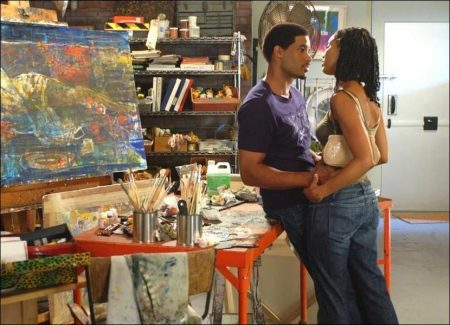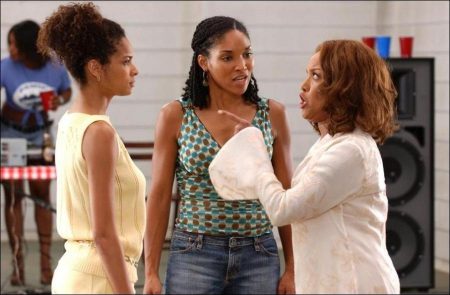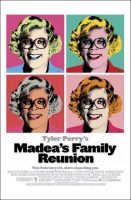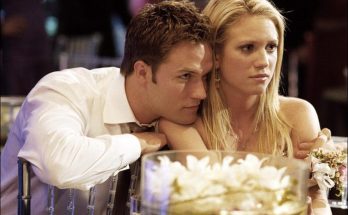After Madea (Tyler Perry) violates the terms of her house arrest (which she was subjected to in the previous film), the judge orders her to take in a troubled foster child named Nikki (Keke Palmer) in order to avoid jail. Lisa Breaux (Rochelle Aytes), one of Madea’s nieces, is engaged to Carlos Armstrong (Blair Underwood), an abusive and controlling investment banker. While she desperately wants to get out of the engagement, her mother, Victoria (Lynn Whitfield), urges her to go through with the wedding, telling Lisa to avoid doing things that make Carlos angry, because Victoria is a conniving gold digger.
Vanessa (Lisa Arrindell Anderson), the other of Madea’s nieces, who lives with her, has two children fathered by two different men, neither of whom is involved in their children’s lives. Victoria regularly degrades Vanessa for this, even referring to her grandchildren as “bastards”. Vanessa is successfully, though through some struggle, wooed by poetry-spouting bus driver Frankie Henderson (Boris Kodjoe), who is the single father of a young son, and has a passion for painting. As much as Vanessa likes Frankie, she is emotionally closed off and has a difficult time trusting him.
Lisa eventually leaves Carlos with the intention of calling off the wedding. She temporarily moves in with Madea. Carlos, eager to move forward with the wedding, dispatches Victoria to bring her back to him. Victoria confronts Carlos about the abuse, suggesting that insecurity about his masculinity is causing him to act out and that he needs counseling. Carlos counters by suggesting that she’s controlling every aspect of Lisa’s life because she wants to make up for her own shortcomings in her own.
It is then revealed that Victoria, with Carlos’s assistance, has stolen from Lisa’s trust fund over the years, leaving virtually no money left, and is now encouraging Lisa to marry Carlos in order to keep up her livelihood. Carlos makes it clear that he will not bail Victoria out unless the wedding goes forward. Victoria goes to Madea’s house to fetch Lisa, only to end up in a passionate argument with Vanessa who has become aware of Carlos’s abuse and is eager to protect her sister.
Madea’s Family Reunion is a 2006 comedy-drama film adaptation of the stage production of the same name written by Tyler Perry and sequel to Diary of a Mad Black Woman. It was written and directed by Perry, who also played several characters, including Madea. It was released on February 24, 2006, nearly one year following its predecessor, Diary of a Mad Black Woman. The independent film was produced by Lionsgate Films.
About the Production
Based on his acclaimed stage production, Madea’s Family Reunion brings back Perry’s beloved matriarch, Madea, as she struggles to resolve mounting tensions within her family, all in anticipation of a massive family reunion. With his trademark combination of riotous, irreverent humor and dramatic intensity, Perry once again delivers a story that is rife with larger-than-life characters, rousing gospel music and inspiring messages about love, forgiveness and family.
“Madea’s Family Reunion is about family and the things we go through as family,” says Perry. “It’s about how secrets that are hidden and buried have to be uncovered for any healing to take place. It’s also about laughing yourself to that place of healing.”
Broader in scope than Diary of a Mad Black Woman, Perry’s new film examines an extensive ensemble of related characters, each engaged in a life-changing relationship: Madea struggles to forge a real bond with Nikki, a rebellious runaway who has been ordered to her care; Lisa, Madea’s niece, is questioning her upcoming marriage to Carlos, her abusive fiancé; and Vanessa, Lisa’s half-sister, is grappling with her mother’s life-long animosity towards her, while tentatively exploring a relationship with Frankie, a handsome bus driver.
Already a firmly established star of urban theater, Perry became a bona fide film star with the release of DIARY OF A MAD BLACK WOMAN in movie theaters last year. His devoted theater audience, built through years of touring and creative output, helped push DIARY, made on a modest $5 million budget, to a domestic gross of over $60 million. With both old and new fans clamoring for more, Perry and his producing partner Reuben Cannon saw MADEA’S FAMILY REUNION as the logical follow-up to DIARY, this time with Perry in the director’s chair.
“The genius of Tyler is that he’s so in touch with his audience from all of his touring. He knows what they want,” says Reuben Cannon. “Even though it’s true to the play, the film version of MADEA is so much bigger and better than the play in terms of the characters . We expect the fans to be just over the moon about this.”
“Tyler has transitioned beautifully from stage to screen,” adds executive producer Mike Paseornek. “He’s found a way to capture all the spirit and humor and energy that have made his plays hits and make it all work on screen. This film is a real triumph for him.”
Perry sees this second film as a welcome opportunity to add depth to his characters, particularly Madea, the tough-talking grandma played by Perry in a padded dress and layers of prosthetics. “Madea’s dropped the guns and the pot-smoking, and has become more of a voice that helps people with their issues,” he says. “She’s a figure who helps bridge generations and hold them together.”
“You can’t make a Tyler Perry movie without Madea,” says Cannon. “Audiences want to adopt her. She’s relatable because everyone has a Madea in his or her family on some level. She says things a lot of us would like to say but don’t.”
Uncle Joe, the lascivious, flatulent brother to Madea who is also played by Perry, also returns to deliver a handful of crass, sidesplitting moments. Despite the four hours it takes in the make-up chair to transform into Uncle Joe, Perry admits he’s his favorite character to play. “Uncle Joe is just so authentic and consistent to who he is,” says Perry. “When I play him, I get to say whatever I want to say. Whatever comes up, comes up.”
Based on Perry’s growing fame and the quality of his writing, he and Cannon had no trouble attracting a talented, and notably attractive, cast for the project. As the abusive Carlos, Blair Underwood (”L.A. Law,” SET IT OFF, RULES OF ENGAGEMENT) brings genuine menace and complexity to a role that might have been one-note in lesser hands. “I love playing the bad guy,” admits Underwood. “It’s not only interesting for me to play, but hopefully it’s more interesting and more unnerving for the audience to try to understand who Carlos is and why he is the way he is.”
“I’ve always wanted to work with Blair, and finally the timing was right,” says Perry. “I have a tremendous amount of respect for him. He’s been working forever, but I still think he’s a hugely underrated actor in Hollywood.”
Perry was still writing the script for MADEA when he realized that the part of Victoria, the imperious, materialistic mother, should go to Lynn Whitfield, an actress he has admired since her portrayal of Josephine Baker in the television movie “The Josephine Baker Story.” “When I wrote the scene where Vanessa tells Victoria, ‘You’re gonna rot in hell’ and Victoria replies, ‘I vacation there,’ I suddenly thought, Lynn has to play this,” remembers Perry. “She’s so intense and so powerful. She’s just incredible.”
“Victoria is just desperately evil and so deeply afraid of not having,” says Whitfield of her character. “It’s always great to play these high sea roles. They’re so exaggerated and severe that you can bring a lot to them and move yourself out of the way. It’s very freeing.”
For the half-sisters Vanessa and Lisa, the two characters who form the heart of the film, Perry discovered two relatively unknown actresses, Lisa Arrindell Anderson and Rochelle Aytes. As the headstrong, bohemian Vanessa who is disowned by her resentful mother, Anderson demonstrates a fierce intelligence and strength onscreen. “A lot of what’s written for African American women is all surface,” says Anderson. “But with Vanessa, I couldn’t ask for a better character to play. I’m so thankful.”
“Lisa is amazing, intelligent, and so beautiful,” says Perry. “I had never heard of her before the casting process began. But when I saw her audition tape, I said, ‘There she is. That’s Vanessa.’”
“I’m so impressed by her performance and how energetic and truthful she is,” says co-star Boris Kodjoe. “She’s a genius.”
As Lisa, the abused wife-to-be who must find the strength to stand up to both her abusive husband and her tyrannical mother, Aytes is achingly vulnerable, subtly charting her character’s difficult transformation from timid victim to independent woman. “Lisa’s struggle is with whether or not she deserves somebody good in her life,” says Aytes. “She’s always lived for her mother, and she goes through this film trying to own up to what she wants.”
Tyler Perry’s Madea’s Family Reunion (2006)
Directed by: Tyler Perry
Starring: Tyler Perry, Blair Underwood, Lynn Whitfield, Henry Simmons, Lisa Arrindell Anderson, Rochelle Aytes, Maya Angelou, Jenifer Lewis, Keke Palmer, Henry Simmons
Screenplay by: Tyler Perry
Production Design by: Ina Mayhew
Cinematography by: Toyomichi Kurita
Film Editing by: John Carter
Costume Design by: Keith G. Lewis
Set Decoration by: Lance Totten
Music by: Elvin Ross
MPAA Rating: PG-13 for mature thematic material, violence, sex, drug references.
Distributed by: Lionsgate Films
Release Date: February 24, 2006
Visits: 177






